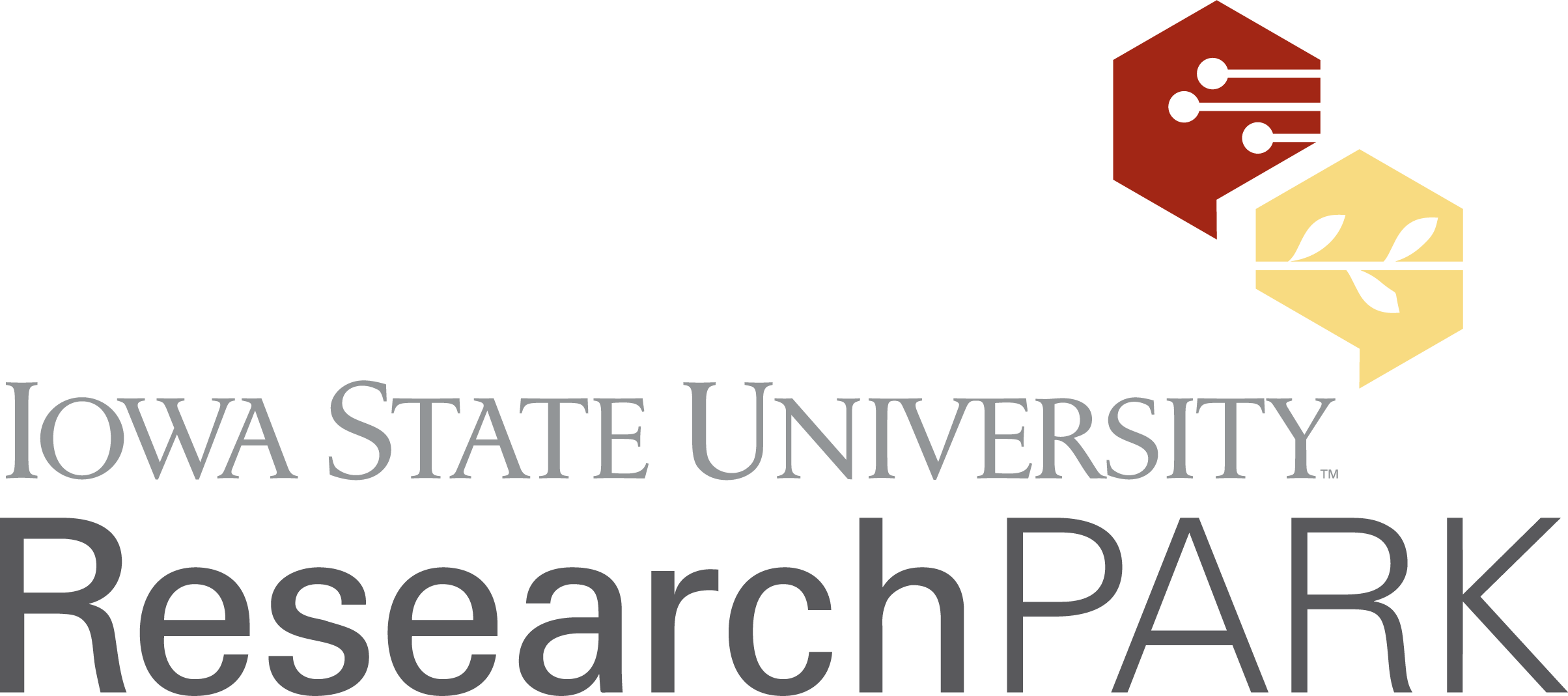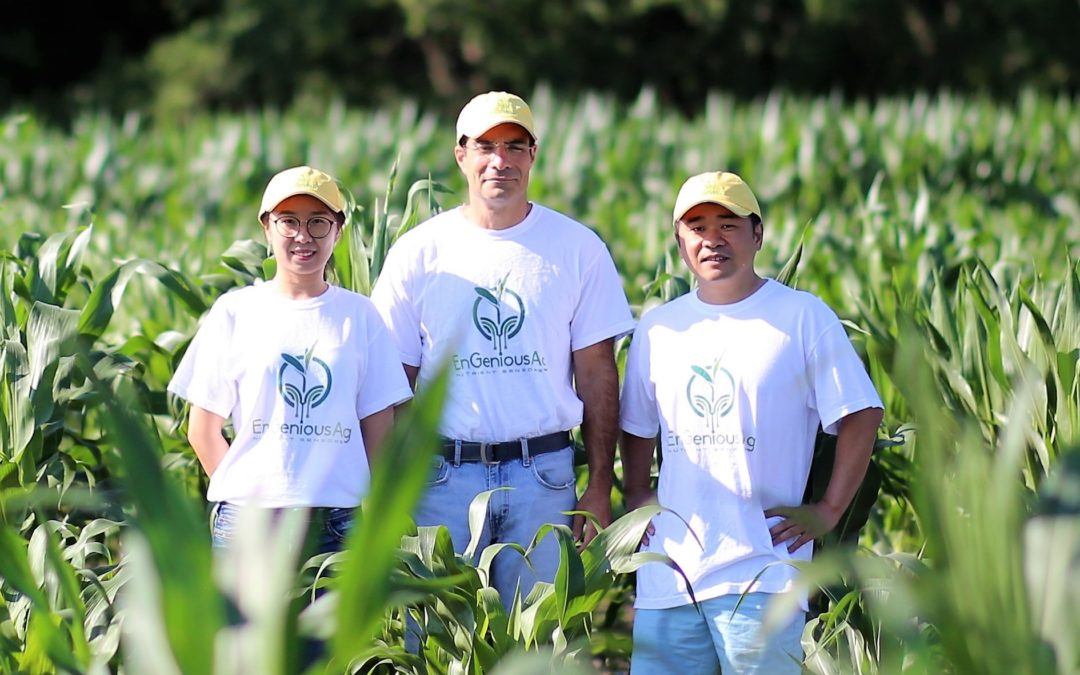(L-R) EnGeniousAg Operations Manager Xinran Wang, Co-founder and Chief Agronomist Michael J. Castellano, Ph.D. and Co-founder and Chief Technology Officer Liang Dong, Ph.D. are part of the team developing an in-planta sensor for monitoring nitrate concentrations in actively growing crop plants. Photo credit: EnGeniousAg Co-Founder and Managing Partner Patrick Schnable, Ph.D.
Small Business Innovation Research Program Provides Seed Funding for R&D
AMES, Iowa (July 30, 2019) – The Iowa State University Startup Factory today announced that EnGeniousAg, LLC, has been awarded a National Science Foundation (NSF) Small Business Innovation Research (SBIR) grant for $225,000 to conduct research and development (R&D) work on an in-planta sensor for monitoring nitrate concentrations in actively growing crop plants.
The technology aims to provide farmers a minimally-invasive means to measure stalk nitrogen (N) in near real time to assist with precision fertilizer management. The grant will support research headed by Principal Investigator and EnGeniousAg Operations Manager Xinran Wang.
“NSF is proud to support the technology of the future by thinking beyond incremental developments and funding the most creative, impactful ideas across all markets and areas of science and engineering,” said Andrea Belz, Division Director of the Division of Industrial Innovation and Partnerships at NSF. “With the support of our research funds, any deep technology startup or small business can guide basic science into meaningful solutions that address tremendous needs.”
“EnGeniousAg is developing microneedle sensors that can be inserted directly into crop plants to measure the amount of nitrate flowing through the plant sap,” Wang said. “The real-time information allows farmers to incorporate the data into decision making, resulting in more precise, and timely, nitrogen fertilizer applications.”

Wang said by monitoring nitrate accumulation within crop plants, farmers will know which fields and which portions of fields are nutrient constrained and could benefit from the application of additional N fertilizer. Similarly, EnGeniousAg’s nitrate sensors will identify those fields that already have sufficient N. By avoiding the application of unneeded fertilizer farmers can increase their profits and sustainability, she said.
“The key to farmer profitability is knowing when the crop needs N and how much N to use, without applying excess that can potentially be lost,” Wang said. “After seed, nitrogen fertilizer is the most costly input to corn production. Yet, each year, farmers lose over 2 billion pounds of N-fertilizer to the Mississippi River and other waterways, resulting in $1 billion in wasted fertilizer, unrealized yield and harm to the environment.”
Wang said traditional methods used to measure stalk N do not provide farmers the rapid feedback realized with EnGeniousAg’s technology.
“Existing methods to measure nitrogen must be conducted in a laboratory setting, requiring farmers to collect samples in the field, mail them to a testing lab, and wait for the samples to be processed and test results to come back,” Wang said. “The long time-lags between sampling and receiving data prevent broad adoption of tests that can improve profitability and environmental quality. Typically, two things can happen during the wait for test results: the farmer misses the optimal time to fertilize—decreasing yield—or the farmer is left to guess what the field needs and compensates by over-fertilizing, potentially decreasing profits and contributing to nitrogen loss and run off.
“Our technology takes a procedure that typically requires from days to more than a week, and delivers results in about a minute. Hence, adoption of EnGeniousAg’s nitrate sensors promise to not only improve farmer profitability, but also water quality and sustainability as farmers reduce agricultural losses of excess nitrogen.”

The NSF award will allow EnGeniousAg to develop an in planta sensor through the fusion of silicon-based microelectromechanical systems (MEMS) technology and novel nanomaterials. The project aims to overcome major technical challenges through improving materials, fabrications, packaging, and validation, including optimizing MEMS fabrication processes to minimize the size of sensors at low cost, improving packaging robustness for sensors, and validate sensor prototypes in a greenhouse.
“We are so grateful for this NSF award,” EnGeniousAg Co-founder and Director of Business Strategy James Schnable, Ph.D. said. “It will allow us to conduct further R&D, optimizing and validating of our microneedle sensor technology. Our aim is to create an in planta sensor to directly detect corn stalk nitrate concentrations with minimal invasion, while being robust to interference from other ions present in the crop stalk or stem. Miniaturization is key to not only making the sensor minimally invasive to the plant, but also in lowering production costs.”
EnGeniousAg is a member of the Iowa State University Startup Factory’s fifth cohort. The Startup Factory is a 52-week intensive program at the Iowa State University Research Park that provides an avenue for students, faculty, staff, and community members to create technology-based, platform businesses. Entrepreneurs in the program receive formal training, resources, and access to a network of business mentors, advisors, counselors, and investors in two 26-week blocks: the first is a formal curriculum centered on business validation, while the second block is more customized to their individual business needs.
“The ISU Startup Factory program was so helpful in guiding us through the customer discovery process and defining our business opportunities,” Wang said. “In addition, they connected us to other helpful resources, such as Iowa Innovation Corporation (IICORP), which administers the state’s SBIR/STTR Outreach Program. The people there were extremely helpful during the process of writing the grant proposal. Both programs helped me see things through a business perspective versus an academic or scientific perspective, which are entirely different approaches. Much of the credit for this successful grant application is owed to them.”
Once a small business is awarded an up to $225,000 Phase I SBIR/STTR grant, it becomes eligible to apply for an up to $750,000 Phase II grant. Small businesses with Phase II grants are eligible to receive up to $500,000 in additional matching funds with qualifying third-party investment or sales.
NSF accepts Phase I proposals from small businesses twice annually in June and December. Small businesses with innovative science and technology solutions, and commercial potential are encouraged to apply. All proposals submitted to the NSF SBIR/STTR program, also known as America’s Seed Fund powered by NSF, undergo a rigorous merit-based review process.
To learn more about America’s Seed Fund powered by NSF, visit: https://seedfund.nsf.gov/
This research is supported by the Division of Industrial Innovation and Partnerships (IIP) of the National Science Foundation under award number 1914251. The content of this press release is solely the responsibility of the authors and does not necessarily represent the official views of the National Science Foundation.
###
About the National Science Foundation’s Small Business Programs
America’s Seed Fund powered by NSF awards $200 million annually to startups and small businesses, transforming scientific discovery into products and services with commercial and societal impact. Startups working across almost all areas of science and technology can receive up to $1.5 million in non-dilutive funds to support research and development (R&D), helping de-risk technology for commercial success. America’s Seed Fund is congressionally mandated through the Small Business Innovation Research (SBIR) program. The NSF is an independent federal agency with a budget of about $8.1 billion that supports fundamental research and education across all fields of science and engineering. For more information, visit seedfund.nsf.gov.
About EnGeniousAg, LLC
EnGeniousAg LLC, was founded by a team of engineers and agronomists in 2018 to develop and commercialize new types of sensors for agriculture. This Iowa-based startup brings together advanced technologies from diverse disciplines to create low cost and rapid readout products to help farmers simultaneously increase profitability and sustainability. For more information on EnGeniousAg, email info@engeniousag.com or visit engeniousag.com.
About ISU Startup Factory
The Iowa State University (ISU) Startup Factory is a 52-week intensive program housed at the ISU Research Park (ISURP). Entrepreneurs in the Startup Factory receive formal training, resources, and access to a network of business mentors, advisors, counselors, and investors in two 26-week blocks: the first a formal curriculum centered on business validation, and the second, customized to their individual business needs. For more information on the ISU Startup Factory program, call 515-294-7444 or visit isustartupfactory.org.
About ISU Research Park
Establish in 1987, The Iowa State University Research Park (ISURP) is a real estate development community closely affiliated with Iowa State University. ISURP assists both established and startup companies in connecting with Iowa State’s vast infrastructure to grow their enterprises; whether through students, research entities, equipment or a multitude of other resources. ISURP is currently home to 93 companies and research centers and 11 affiliates, employing 2,155 and 135 people, respectively, and occupies approximately 800,000 square feet of commercial real estate on 400 acres. ISURP recently expanded and now boasts 400 acres of developable space, which will include tenant amenities, a park and multi-use trails. For more information on ISURP, call 515.296.4204 or visit isupark.org.
Contact:
Julie Lelonek, Office of Economic Development and Industry Relations Communications
515-294-1562, jlelonek@iastate.edu
Iowa State University
Office of Economic Development and Industry Relations
1805 Collaboration PlaceAmes, IA 50010

